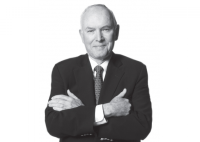Leaders, Values and Culture
11 Apr 2013
The CEO’s job is like no other in the organization. Broadly speaking this huge responsibility boils down to two basic functions: setting the organization’s aspirations and mobilizing the organization to meet them. We deliberately use the word aspirations because to set direction for an organization is more than just a cognitive exercise. Setting direction also has a strong component of emotion. The ultimate destination becomes something people in the organization want to reach; therefore, effective leadership taps into people’s core values and ensures everyone is striving toward the same goal.
Leadership and Values
Values are important to understanding leadership because they explain the focus and direction of people’s actions. In our work, we use the Motives, Values, and Preferences Inventory (MVPI), a 10-scale instrument designed to assess an individual’s core values. While studying the relationship between values and leadership, we uncovered four different values clusters. Each of the clusters produces a coherent, explicit managerial character. They are: the strategist, the analyst, the mentor, and the innovator.
The Strategist
Executives who use this approach are driven by power, recognition, and excitement. Interpersonally, they are forceful and decisive. Accordingly, they create a work environment that is competitive and confrontational. For them, devising a winning strategy is the highest priority. As a result, time is devoted largely to matters external to the organization’s operations-customers, competitors, technological advances, and market trends-as opposed to internal matters such as hiring or control systems. They rely on employees to whom they can delegate the day-to-day operation of their organizations, as well as those who possess excellent analytical and planning skills.
The Analyst
Executives who exhibit this character desire to control resources and pursue stability and predictability. Interpersonally, they are polite and businesslike. Accordingly, the internal climate of the organization is formal and structured. Their primary concern is creating an efficient system, one that provides customers with a consistent and risk-free experience. As a result, this person maintains the structure and flow of work. In addition, they devote much of their time to developing detailed prescriptive policies, procedures, and rewards to reinforce desired behaviors. Lastly, these executives prize experience and usually promote people with many years of service to the corporate team.
The Mentor
These executives value collaboration, helping others, and maintaining high standards. Interpersonally, they are open, warm, and friendly; thus, they create an internal climate that is comfortable and cordial. Their primary job is to hire and cultivate people. Accordingly, these executives spend the majority of their time in personnel-related activities, such as recruiting, performance reviews, and career planning. For them, superior execution is imperative, and this depends upon individuals who will act intelligently, swiftly, and appropriately without constant supervision. Finally, because they strive for continuity, they prize employees who embody the “company way.”
The Innovator
For these executives, knowledge and imagination are prime values. Interpersonally, they are bright, curious, and enthusiastic; thus, they build an environment that is conducive to learning and experimentation. Unlike strategy CEOs, these executives focus more on process than final destination. As expected, promoting change is their main job. To accomplish their objectives, they pay special attention to revamping an organization’s performance evaluation and reward systems. Additionally, they spend their days meeting with employees, customers, suppliers, and shareholders to champion change and encourage others. For them, the reinvention of business practices and products is imperative. Not surprisingly, the people they value are aggressive, independent, and creative.
A Values-Based Leadership Framework
The four managerial characters that emerged from our research are not rigid roles in which all executives can be cast; however, the four approaches do offer a framework for understanding how management character directly influences work group productivity and commitment.
Moreover, our studies indicated that the most effective CEOs were those whose values were most like those of the firm, rather than those who had the greatest knowledge of the firm’s industry. This makes sense because it indicates that talent and hard work cannot overcome fundamental differences in executives’ individual values and those of the larger group.
Furthermore, leaders whose actions are inconsistent with their espoused values are regarded as hypocrites at best, deceitful at worst. Research by Kouzes and Posner shows that the characteristic of leaders that is most strongly associated with their effectiveness is their perceived integrity. Successful leadership depends on acting in accordance with values that are also endorsed by the group. In other words, people will only follow the lead of individuals whose prime values align with their own. After all, leadership is a relational activity. In the absence of shared values the leader-follower relationship dissolves.
We, therefore, recommend organizations take into account a candidate’s core values when filling leadership positions because the individual-toorganization fit is essential to success.
Dr. Robert Hogan, founder of Hogan Assessment Systems, is recognized as an international authority on personality assessment, leadership, and organizational effectiveness. He has authored more than 300 journal articles, chapters and books, and is widely credited with demonstrating how personality factors influence organizational effectiveness.
Article offered by HART Consulting. More about Romanian leadership styles and values you can learn during the HART Consulting conference on the 22nd of May.
Dr. Robert Hogan, founder of Hogan Assessment Systems
published in Romania Insider





